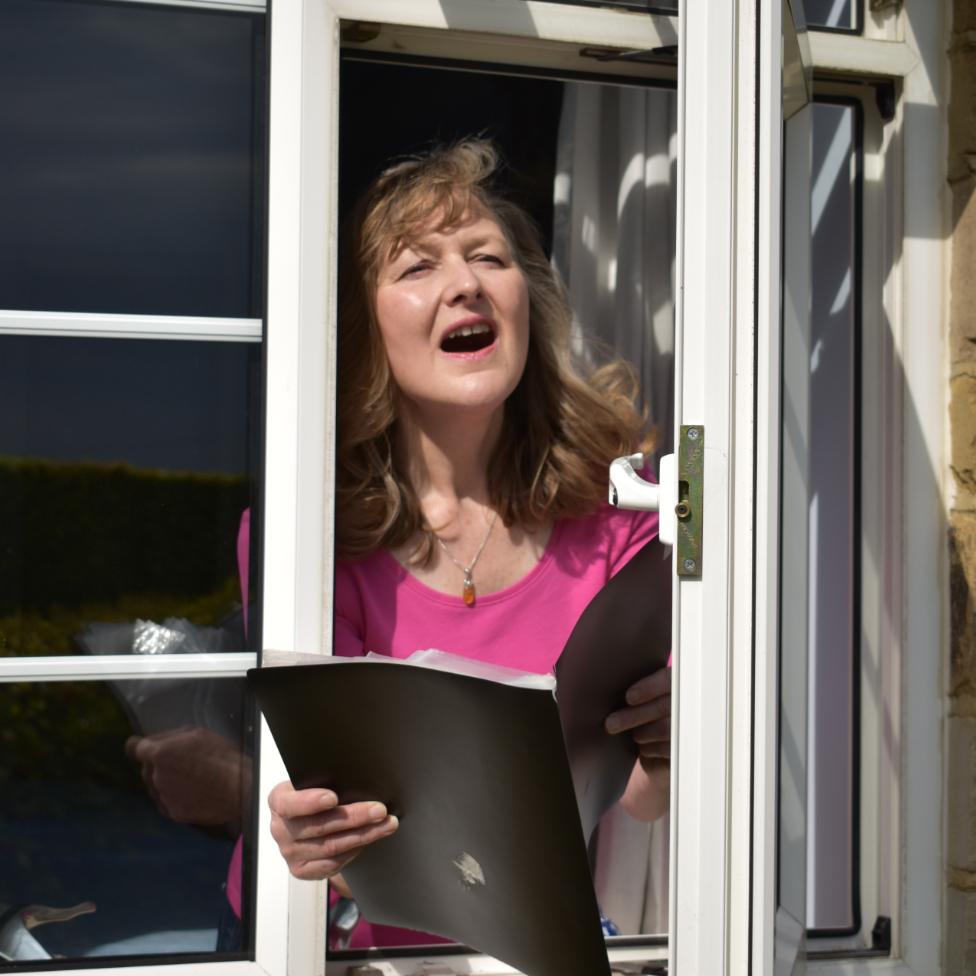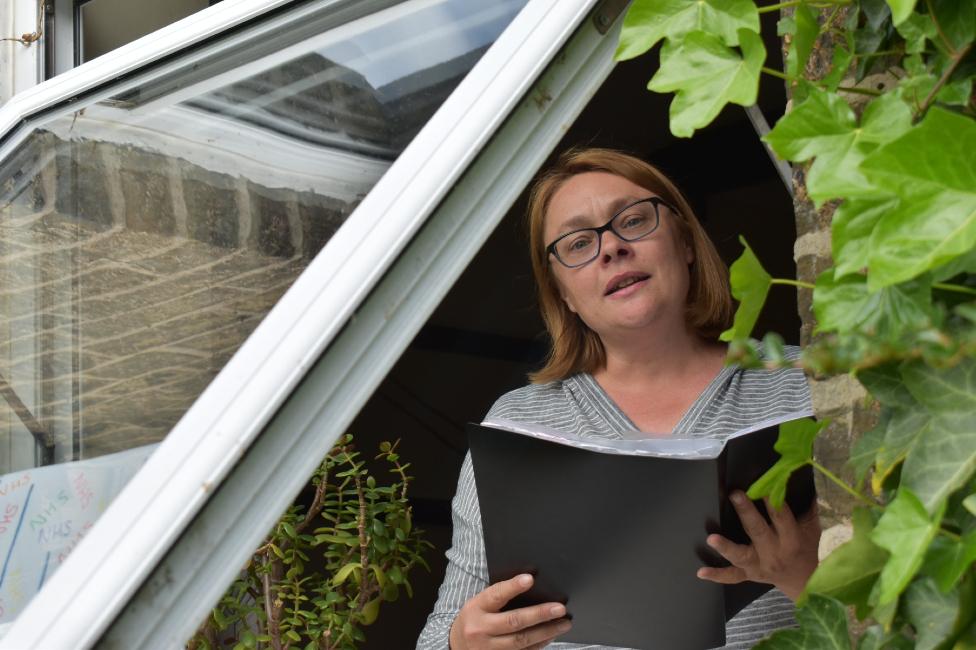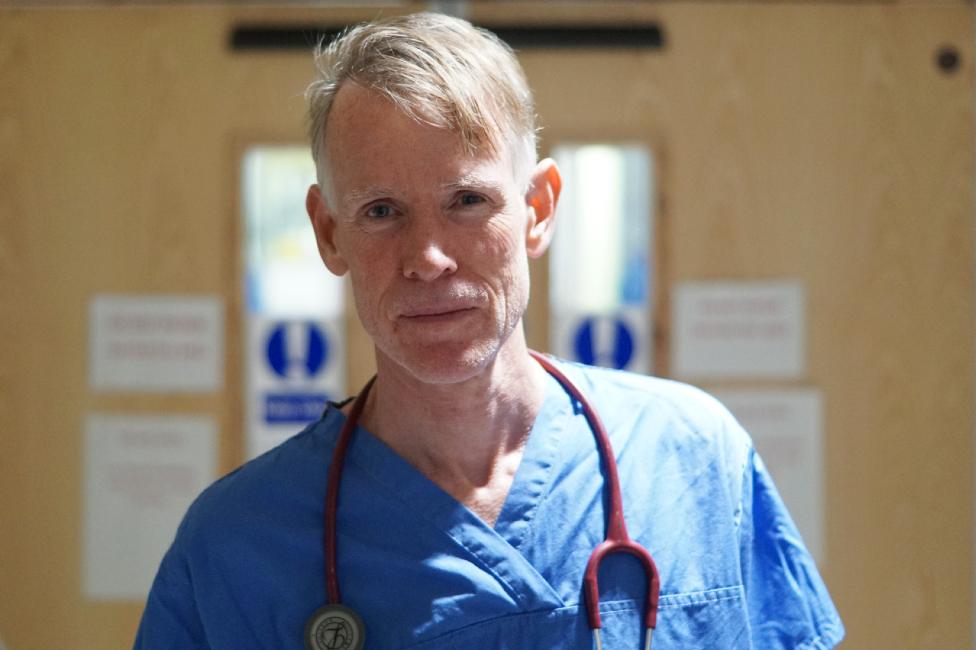Coronavirus doctor's diary: The strange case of the choir that coughed in January
- Published


Dr John Wright of Bradford Royal Infirmary is intrigued by a group of amateur singers who experienced a viral illness with familiar symptoms long before the first recorded case in the UK.
One of the unexpected benefits of Covid-19 is that, finally, everyone knows what an epidemiologist does. I no longer get mixed up with a dermatologist and asked to look at people's skin rashes.
An epidemiologist is a medical detective, and like all detectives, the three key clues we are looking for are always: person, place and time.
So when I got an email out of the blue from a Bradford resident saying that she and her friends may have been infected with Covid-19 in January - nearly two months before the first confirmed case of transmission in the UK - I looked for these clues and decided to investigate further.
Jane Hall is a member of two choirs - the Voices of Yorkshire choir and the All Together Now Community Choir - and she says that Covid-like symptoms affected members of both, starting in early January.
Among the first singers to get ill was the partner of a man who returned from a business trip to Wuhan on 17 or 18 December and developed a hacking cough.

Suzanne Smith: "This was before Covid-19 was widely talked about"
"My friend from the choir became ill mid-January. Then my best friend, Christine, became ill, and then I became ill in the first weekend of February," Jane said.
She went on to describe her symptoms.
"I had a throat that felt like I had swallowed broken glass, a high temperature, headaches... I was totally fatigued - I slept for two whole days which was totally unlike me. I had a high temperature and a dry unproductive cough."
With the passing of time, a new symptom emerged.
"It was like breathing through treacle - I was really struggling to breathe and it felt like there was a lot of gunk I was trying to breathe through."

Front line diary

Prof John Wright, a medical doctor and epidemiologist, is head of the Bradford Institute for Health Research, and a veteran of cholera, HIV and Ebola epidemics in sub-Saharan Africa. He is writing this diary for BBC News and recording from the hospital wards for BBC Radio 4's The NHS Front Line
Listen to the next episode at 11:00 on Tuesday 12 May, catch up with the previous episodes online, or download the podcast
You can also read the previous online diary entry: Is lockdown good for your heart?

And later Jane noticed yet another symptom - an impaired sense of smell. Already on the mend, she visited her friend, Simon, a member of the All Together Now Community choir, who was also ailing. She made him a hot drink.
"And the milk curdled when I put milk in the tea. And I said, 'Oh, isn't the milk off?' And he said, 'Oh well, I had some this morning and it did the same but I couldn't taste any different.' So I smelled the milk, and I couldn't smell anything. And I couldn't understand how come I couldn't smell it - the milk was off."
Jane was describing some of the classical symptoms people can experience with Covid-19. On most occasions when people contact me to say they had an illness like this last year, I reassure them that it was probably a different viral infection. But Jane's story, with the link to Wuhan in mid-December, is very interesting.

Chris Kemp has kept the choir active online, singing in an imaginary Covid holiday resort
Chris Kemp, who runs the All Together Now Community Choirs, was also among the first to get ill, with a cough and a feeling of exhaustion. He says he first felt poorly on 27 December, and didn't feel properly better until early February.
A singer in the choir, Suzanne Smith, points out that its "Christmas" party takes place in January, and that people could have infected one another with the mystery illness there. She herself came down with it later in the month. But at that point, awareness of Covid-19 was low.
"We didn't really know about Covid," she says. "I work in a doctor's surgery but this was before it was widely talked about. I think it could have been what we had. It is intriguing."
Simon Rochester, who drank the tea Jane made with sour milk on 8 February, says choir members had noticed how many of them were coming down with a similar illness, but didn't make a connection with the coronavirus.

Christine Mclay experienced vomiting, as well a sore throat and a temperature
"If it was something we'd heard of it was in the news, like 'China had this problem and blah, blah, blah,'" he says. "So we didn't really recognise that there was any possibility that we would have anything."
By all accounts, the members of the choir are very friendly. They socialise as well as sing, and there is plenty of hugging. Simon Rochester describes it as "an ideal breeding ground" for infection. And it's likely they passed their virus to some outside the choir as well.
Juanita Kearns runs the Bulls Head pub in Baildon, just north of central Bradford, the destination for Altogether Now choir members after their weekly practice session in a church hall nearby. Towards the end of January she collapsed, barely able to breathe, and went to bed, sweating profusely. Her doctor called an ambulance.

Juanita Kearns outside the Bulls Head
"My doctor asked if I'd been to China, the ambulance people asked if I'd been to China and the hospital asked me the same. I said no, and explained again about being a pub landlady. They said I appeared to have a lung condition and sent me home," she says.
"I think they need to test us all, so many of us have been so ill. It's like nothing I've ever known. The entire choir are always in here, we are all friendly together. I'm only 53, no underlying health conditions and never ill. This was really strange and I'm convinced we all had it."
These experiences are fascinating. We have to be cautious about assuming that this is Covid-19 - there will have been lots of other seasonal viral illnesses circulating - but what interests me in this case is the pattern of transmission, the timeframe and what's been described about the initial link to what we think was happening in Wuhan.

Carol and Keith Brown had a cough, a headache, a "tight feeling" in the chest and a tingling sensation in their mouths
In all epidemics, when you start tracking back, you find that there were cases much earlier than expected. The nature of epidemics is they do start very, very slowly - one or two people, gradually increasing - and before it hits people's radar it's been lurking just below it for some time.
So I'm sure there will be cases where people have travelled to Wuhan, who have been exposed to the virus before it was officially announced by the Chinese government, and who have come back and had symptoms (or have been infected but asymptomatic).
The test for Covid-19 we have at present only tells us whether someone is infected at the time the test is carried out. We haven't yet, in the NHS, got a reliable test that reveals whether someone had it in the past, but we hope to have one in the next few weeks.
When we do, it will be very interesting to see whether Juanita and Jane and her choral friends had a normal winter virus - or were among the first in the UK to experience the Covid-19 pandemic.
Follow @docjohnwright, external on Twitter

A SIMPLE GUIDE: How do I protect myself?
AVOIDING CONTACT: The rules on self-isolation and exercise
LOOK-UP TOOL: Check cases in your area
MAPS AND CHARTS: Visual guide to the outbreak
